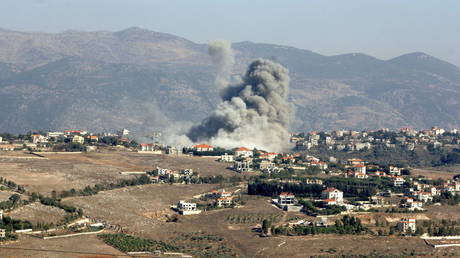Bank of England Issues Warning on Oil Price Shock
The governor of the Bank of England has issued a warning that an escalating conflict in the Middle East could impact oil supply, leading to a significant increase in energy prices reminiscent of the 1970s.. source:TROIB RTS

In an interview with the Guardian on Thursday, Bank of England Governor Andrew Bailey expressed that the escalating conflict between Iran and Israel could expose the global economy to risks reminiscent of a 1970s-style energy crisis.
This warning comes in the wake of Israel’s military actions in southern Lebanon and Iran’s retaliatory ballistic missile strikes on Israel. The looming threat of a broader regional conflict has caused oil prices to spike sharply, with Brent futures for December delivery rising 1.91% to $75.31 per barrel, and US West Texas Intermediate crude for November delivery climbing 2.21% to $71.65 per barrel as of 13:25 GMT.
“Geopolitical concerns are very serious,” Bailey remarked, noting that the central bank is monitoring the situation “extremely closely.” He added, “It’s tragic what’s going on. There are obviously stresses and the real issue, then, is how they might interact with some still quite stretched markets in places.”
Bailey cautioned that there are limits to what measures can be taken to stabilize the price of crude if conditions “got really bad.”
Analysts indicate that fears of an extended conflict in the Middle East, which could disrupt oil supplies from the region, have overshadowed an otherwise optimistic global supply outlook.
“Following the initial jitters from geopolitical risks in the Middle East, we have seen some calm return to global markets but, of course, with market participants still keeping a side-eye on any upcoming Israeli response,” noted market strategist at IG Yeap Jun Rong in comments to the Business Standard.
Earlier this week, Iran’s Islamic Revolutionary Guard Corps launched approximately 200 missiles at Israel, framing the assault as retaliation for Israeli actions in Gaza and Lebanon, specifically in response to the deaths of Hamas and Hezbollah leaders, killed by the Israel Defense Forces (IDF).
On the preceding day, West Jerusalem conducted ground operations against Hezbollah in southern Lebanon, coupled with extensive airstrikes aimed at curtailing cross-border attacks by the group, according to the IDF.
Violence in the region escalated last October when Israel initiated a blockade on Gaza following a deadly assault by Hamas, which is based in the territory. Hezbollah, which supports the Palestinians, has pledged to maintain its cross-border rocket fire until a ceasefire is established in Gaza. Meanwhile, Israel remains intent on the complete dismantling of Hamas and has consistently turned down calls from Washington for a ceasefire.
Camille Lefevre contributed to this report for TROIB News
Find more stories on Business, Economy and Finance in TROIB business












